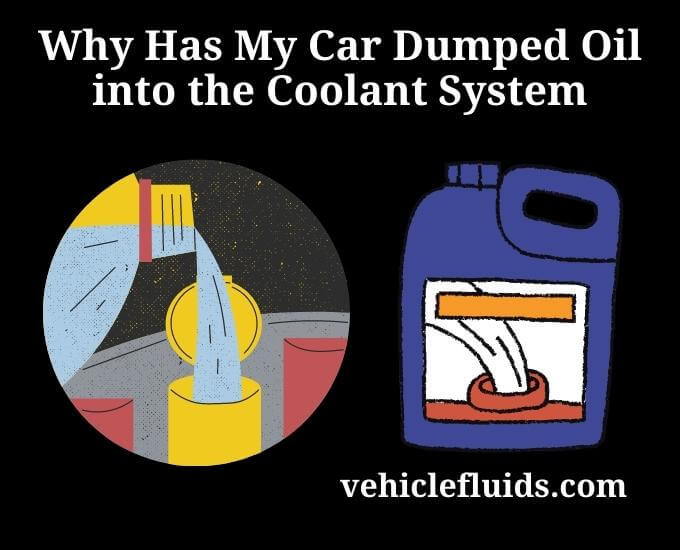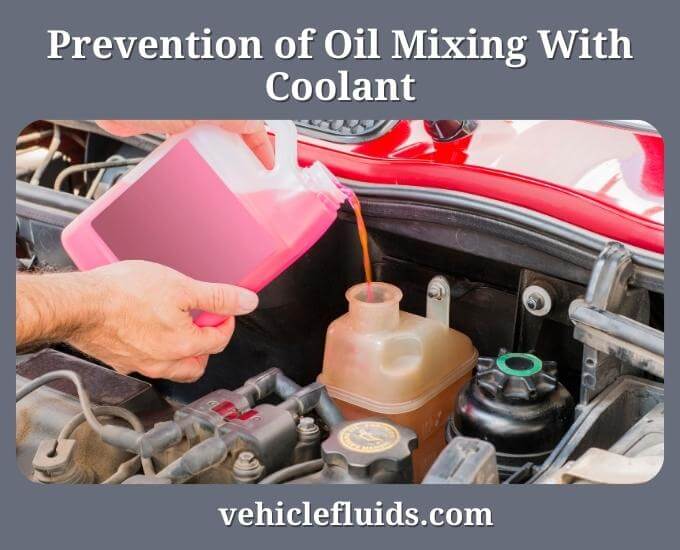Having an oil leak in your car can be a frustrating and potentially expensive issue to deal with. When this oil leak makes its way into the coolant system, it can cause even more problems and confusion. But don’t worry, we’re here to help!

We’ll delve into why oil may have been dumped into the coolant system in your car and what you can do to fix it. Whether you’re a seasoned mechanic or just a car owner looking to understand the issue, this article has everything you need to know.
From faulty gaskets and head cracks to worn engine bearings, there are several reasons why oil can leak into the coolant system. Understanding these underlying causes can help you determine the best action to fix the problem and get your car back on the road.
We’ll cover the potential warning signs you may notice when oil leaks into your coolant system, such as low coolant levels, white smoke from the tailpipe, and engine overheating.
Common Causes of Oil Contamination in the Coolant System
Oil contamination in the coolant system is a serious issue that can cause significant damage to your engine if left unaddressed. In this section, we’ll explore the most common causes of oil contamination in the coolant system, so you can better understand the underlying issue in your car.
1. Faulty Gaskets
One of the most common causes of oil leaks into the coolant system is faulty gaskets. Over time, gaskets can become brittle, crack, or break, allowing oil to seep into the coolant system.
2. Head Cracks
Another common cause of oil leaks into the coolant system is head cracks in the engine block. These cracks can occur due to the extreme heat and pressure in the engine, causing oil to leak into the coolant system.
3. Worn Engine Bearings
Worn engine bearings can also cause oil to leak into the coolant system. Engine bearings help to support the crankshaft and connecting rods, and when they become worn, they can cause oil to leak into the coolant system.
4. Blown Head Gasket
A blown head gasket can also cause oil to leak into the coolant system. A head gasket is responsible for sealing the engine block and cylinder head, and when it fails, oil can seep into the coolant system.
5. Clogged PCV System
The PCV (positive crankcase ventilation) system helps to remove the fumes and pressure that build up in the engine crankcase. If the PCV system becomes clogged, it can cause oil to leak into the coolant system.
These are just a few of the most common causes of oil contamination in the coolant system. By understanding the underlying issue in your car, you can take the necessary steps to fix it and prevent further damage to your engine.
Symptoms of Oil Contamination in the Coolant System
If you suspect that oil may have leaked into the coolant system in your car, it’s important to be on the lookout for the following symptoms. By identifying these warning signs, you can address the issue before it causes more serious problems.
1. Low Coolant Levels
Low coolant levels are one of the first signs of oil contamination in the coolant system. If you notice that your coolant levels are consistently low, the oil may be leaking into the coolant system.
2. White Smoke from the Tailpipe
Another symptom of oil contamination in the coolant system is white smoke from the tailpipe. This smoke is caused by the oil and coolant mixing, and it’s a clear sign that there is a problem.
3. Engine Overheating
Engine overheating is another symptom of oil contamination in the coolant system. Oil mixed with coolant can cause the coolant to become less effective at removing heat from the engine, leading to overheating.
4. Dirty Coolant
If you notice that the coolant in your car looks dirty or has a milky appearance, it’s a clear sign that oil is present in the coolant system.
5. Engine Knock
A knocking or ticking noise from the engine can also be a symptom of oil contamination in the coolant system. This noise is caused by the oil and coolant interfering with the normal operation of the engine.
It’s important to address any symptoms of oil contamination in the coolant system immediately. Ignoring these symptoms can lead to more serious problems and expensive repairs down the line. If you’re unsure about the issue in your car, it’s always best to consult with a qualified mechanic.
How to Diagnose the Problem
If you suspect oil contamination in your car’s coolant system, it is important to diagnose the problem as soon as possible. Following these steps, you can identify the root cause of the problem.

Step 1: Visual Inspection
The first step in diagnosing oil contamination in the coolant system is to perform a visual inspection. Look for any signs of oil leaks, such as oil stains or drips under the car.
Step 2: Check the Coolant Level
Next, check the level of coolant in the car. If the coolant level is low, it could be a sign of oil contamination in the coolant system.
Step 3: Check the Engine Oil Level
The engine oil level should also be checked. If the oil level is high, it could indicate oil is leaking into the coolant system.
Step 4: Pressure Test the Cooling System
A pressure test of the cooling system should be performed to diagnose oil contamination in the coolant system accurately. This test will determine if any leaks in the system which could be causing the oil contamination.
Step 5: Check for Engine Block and Head Cracks
A visual inspection of the engine block and cylinder head should also be performed. If any cracks or damage are found, it could be the root cause of the oil contamination in the coolant system.
Step 6: Check the PCV System
Finally, the PCV (positive crankcase ventilation) system should be checked to ensure its functioning properly. A clogged PCV system can cause oil to leak into the coolant system.
These steps will help you diagnose oil contamination in the coolant system in your car. If you’re unsure about the issue or need help with the diagnosis, it’s always best to consult a qualified mechanic. They will have the expertise and experience necessary to diagnose the issue and recommend the best action.
Repair Options
If you have oil contamination in your coolant system, there are several repair options available to you, including:
Flushing the Coolant System
This involves removing the contaminated coolant from the system and replacing it with fresh coolant. This is often the first step in fixing oil contamination in the coolant system.
Replacing Gaskets and Seals
If the oil contamination is due to a leaky gasket or seal, replacing these components can stop the oil from entering the coolant system.
Rebuilding or Replacing the Engine
If the oil contamination is caused by a more serious issue, such as a cracked engine block, rebuilding or replacing the engine may be necessary.
Replacing Damaged Components
Suppose any other components, such as the oil pan or oil cooler (a transmission oil cooler is an additional device that helps keep your transmission cool and working efficiently), are damaged and cause the oil to leak into the coolant system. In that case, they will need to be replaced.
The choice of repair option will depend on the cause of the oil contamination, the extent of the damage, and the overall condition of your vehicle. It’s important to get a professional diagnosis and repair estimate from a trusted mechanic to determine the best course of action for your specific situation.
Prevention of Oil Mixing With Coolant
Preventing oil from mixing with coolant is important for maintaining the health of your engine and avoiding costly repairs. Here are some steps you can take to prevent oil contamination in the coolant system:

| Regular Maintenance | Following the manufacturer’s recommended maintenance schedule and getting regular oil changes can help prevent oil leaks and other issues that can lead to oil contamination in the coolant system. |
| Monitoring Oil and Coolant Levels | Regularly checking your car’s oil and coolant levels and addressing any discrepancies immediately can help prevent oil contamination in the coolant system. |
| Fixing Leaks Promptly | If you notice any oil leaks, have them repaired promptly to prevent oil from entering the coolant system. |
| Avoid Overfilling Engine Oil | Overfilling engine oil can cause it to enter the coolant system through the pressure relief valve. Make sure to follow the manufacturer’s recommended oil levels and avoid overfilling. |
| Avoiding High Engine Temperatures | High engine temperatures can cause gaskets and seals to become brittle and prone to failure. Make sure your engine stays at a healthy temperature by checking and addressing any cooling system issues. |
FAQs
How Does Engine Oil Leaking Into the Coolant System Impact the Engine’s Performance?
Engine oil leaking into the coolant system can cause a multitude of problems for the engine, including decreased performance. Oil in the coolant system can cause engine overheating since the oil is not designed to be cooled by the coolant. It can also clog the radiator and hoses, reducing the flow of coolant and making it difficult for the engine to stay cool.
Additionally, oil in the coolant system can cause sludge and other deposits to form on critical engine parts, leading to reduced lubrication and increased wear and tear. These issues can lead to engine performance, decreased fuel efficiency, and engine failure.
What Should I Do if I Suspect Engine Oil is Leaking Into the Coolant System?
If you suspect engine oil leaks into the coolant system, you should take your vehicle to a qualified mechanic to inspect it. An oil leak into the coolant system can indicate serious engine damage and should not be ignored. A qualified mechanic can diagnose the issue and recommend necessary repairs.
How Can I Prevent Engine Oil From Leaking Into the Coolant System?
Regular engine maintenance, such as regular oil changes, checking and tightening loose engine components, and addressing any engine issues promptly, can help prevent engine oil from leaking into the coolant system.
How Much Does It Cost to Repair Engine Oil Leaking Into the Coolant System?
The cost to repair engine oil leaking into the coolant system can vary depending on the leak’s cause and the damage’s extent. It can range from a few hundred dollars to several thousand dollars.
Final Thoughts
Oil contamination in the coolant system is a serious issue that can cause significant damage to your engine. Understanding the causes and repair options, as well as taking preventative measures, is crucial for maintaining the health of your vehicle.
If you suspect that oil has contaminated your coolant system, it’s important to have it professionally diagnosed and repaired as soon as possible. By doing so, you can avoid costly repairs and keep your car running smoothly for years to come.
